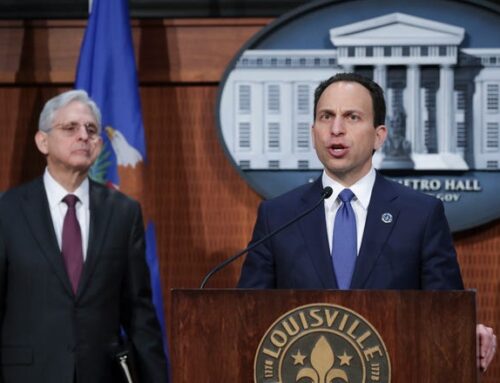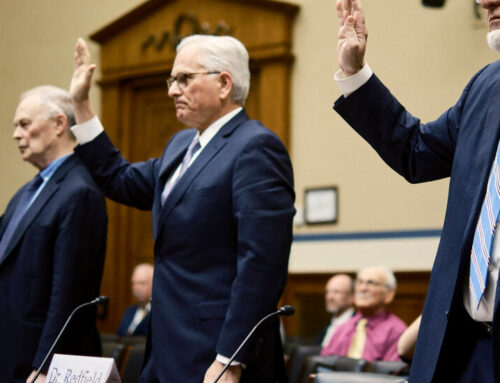Just after midnight on June 1, 2020, at the height of the protests over the killing of Breonna Taylor, a group of military trucks carrying police officers and National Guard members pulled up to an intersection in West Louisville. They had just received an order to clear the lot of Dino’s, a popular corner store where people tended to gather on weekends.
As law enforcement, many dressed in full riot gear, walked through the lot, one officer crossed the street and began firing pepper balls at a group of people at a barbecue restaurant owned by David McAtee. Minutes later, around 20 bullets had been fired, and McAtee was dead.
In the 11 months since the incident, the police department has kept most of its investigation from the public and pushed an official narrative: that police went there to disperse the last large crowd of protests, and that officers returned fire after McAtee fired first. But an investigation by VICE News, based on unreleased internal documents, body camera footage, and accounts from multiple inside sources with direct knowledge, shows that the chaotic situation that ended in McAtee’s death was created by the police, which fired pepper balls indiscriminately at bystanders on private property.
LMPD has repeatedly misrepresented the narrative of that night, according to multiple sources who say there was no intelligence that showed protesters were regrouping at this intersection, or that the parking lot at the gas station looked any different from any other night and needed a heavily armed detail of officers and National Guard to clear it.
The order to deploy to the intersection seemed like an obvious “power play,” according to one high-ranking officer. It set off a series of events that ended with McAtee being shot in the chest, and even some of the highest-ranking members of the LMPD considered it unnecessary.
“It was a flex of the muscle,” said another high-ranking LMPD officer.
“There’s a lack of accountability on multiple levels,” the source added. “What was to be gained by this?”
The police department was struggling to contain the fourth straight day of large-scale protests. The city had called in the National Guard and instituted a 9 p.m. curfew.
LOUISVILLE POLICE AND NATIONAL GUARD CONDUCTED AN OPERATION TO CLEAR A PARKING LOT, DAYS AFTER THE DEATH OF BREONNA TAYLOR. (PHOTO: LMPD BODYCAMERA FOOTAGE)
It was almost midnight and protests had mostly died down, when Lt. Col. Josh Judah, the commanding officer on the ground, called in to the command center where LMPD brass and the mayor’s office followed activity through the city’s network of surveillance cameras, according to multiple people in the room. They say he wanted to make sure everyone was watching the surveillance cameras at 26th and Broadway, the intersection where Dino’s and McAtee’s restaurant were both located, and that the message was clear: “Check out what we’re about to do.”
Everyone, they said, then turned to the surveillance screens, and watched as law enforcement arrived at 26th and Broadway.
“I put up my feet and got out the popcorn,” one officer in the room told VICE News. “That’s how the message was delivered.”
When officers and National Guard members arrived on the scene, there were about 20 cars parked in and around Dino’s, and about as many people walking around. No one appeared to be protesting. But surveillance footage shows that people quickly began to disperse.
One LMPD officer—Katie Crews—crossed the street and started firing pepper balls at people gathered at McAtee’s restaurant, including several directly at McAtee’s niece, Machelle. In an interview with LMPD and Kentucky State Police investigators, which was obtained by VICE News, Crews said she was giving verbal commands for Machelle to go inside, but that because Machelle refused, she continued to fire pepper balls at her.
When asked by investigators to elaborate on details of the incident, including describing her “sight picture” as she fired, she is unable to describe anything further. Machelle told us she didn’t hear any verbal commands, and it’s hard to reconcile Crews’ explanation with the fact that Machelle, along with several others who Crews targeted, were on private property when she began firing.
“We’re not on the sidewalk, we’re not on the street,” Machelle told VICE News, in an interview. “I was blindsided.”
At no point did investigators ask Crews why she fired pepper balls at individuals on private property, or why she directed them at Machelle, instead of to the ground, as dictated by policy.
Crews continued to fire at Machelle, even as she ran inside the restaurant. Surveillance footage shows pepper balls exploding in the doorway next to her head. Machelle said it happened so fast she didn’t even have a moment to register what was going on. Panicked, she turned to her uncle.
“I’m like, they out fucking shooting at us, whoever is there shooting at us,” she said. “I don’t think I honestly realized it was the fucking police until after.”
A MEMORIAL FOR DAVID MCATEE AT THE SITE OF A DEADLY RAID BY LOUISVILLE POLICE ON JUNE 1, 2020. (PHOTO: BEN BISHOP/VICE NEWS)
Surveillance footage shows McAtee reaching out of the door and firing a shot into the air. He pulls his arm back inside before reaching out again, this time far enough for his body to breach the door. McAtee appears to let off a second shot as he is hit in the chest. Moments later he collapsed inside, right next to his niece.
In a matter of seconds, two LMPD officers—Crews and Austin Allen—and two National Guard members had fired about 18 bullets, including the one that killed McAtee, according to state officials.
In the Emergency Operations Center that night, members of LMPD leadership were reportedly dumbfounded by what they had seen. One source inside the room told us they were sitting there shaking their head like, “What was to be gained by this?” Another remembers then-Chief Conrad expressing confusion as to why officers had been sent there, as the crowd outside the gas station looked as it did every other weekend night.
That sentiment is echoed by officers who arrived on scene. Bodycam footage of the immediate aftermath of the shooting captures Major Paul Humphrey, one of the highest-ranking officers to respond to the scene, telling a National Guard member, “This ain’t nothing but a weekend night at Dino’s.”
He voiced a different sentiment at a press briefing later that day, when he put forth what was to become the official narrative of what happened: This was the last large crowd gathering in the city, and officers were sent to disperse it.
Later, Lt. Col. Judah would defend his decision, citing “intelligence” that protesters were regrouping in that area. Sources inside LMPD dispute this, saying surveillance teams had not flagged unusual activity in the area. One officer suggested that Judah used the word “intelligence” because it sounded official enough that the public wouldn’t question it.
The city has always maintained that there is no body camera footage of the incident itself. Officer Allen told investigators that he didn’t turn on his camera because his riot gear covered the camera mount. Officer Crews said her riot gear also prevented her from putting on the camera, though she subsequently took off the protective plates and forgot to remount her camera: “With everything going on,” she told investigators, “I’m just not thinking about putting it back.”
LMPD has never addressed why the other officers who were present at the time of the shooting were not wearing body cameras. But the body camera footage obtained by VICE News shows that at least one officer nearby began recording footage before shots were fired. Pictures taken later that morning by the department’s internal investigations division show seven other officers who were present; three of them are wearing body cameras, and recorded footage later in the night, raising the question of why they did not activate their cameras for clearing the lot.
LMPD’s Public Integrity Unit and Kentucky State Police completed their investigation into the officers who fired their weapons back in August, but the report has remained open in the intervening nine months as it sits with the Commonwealth Attorney for review and as a federal investigation remains open. Machelle says she was interviewed by investigators, but not until after the investigation was declared complete.
The FBI is conducting its own investigation into McAtee’s death. On Monday, Attorney General Merrick Garland announced a federal investigation into Louisville Metro Police Department that would examine whether the department engages in discriminatory policing, including in conducting traffic stops, obtaining and executing search warrants, and using force against civilians. LMPD did not respond to requests for comment for this article, but in a press conference shortly after Garland’s announcement, the newly installed police chief, Erika Shields, cast the federal investigation as a welcome opportunity.
“I think that it’s necessary because police reform, quite honestly, is needed in nearly every agency across the country,” she said.



